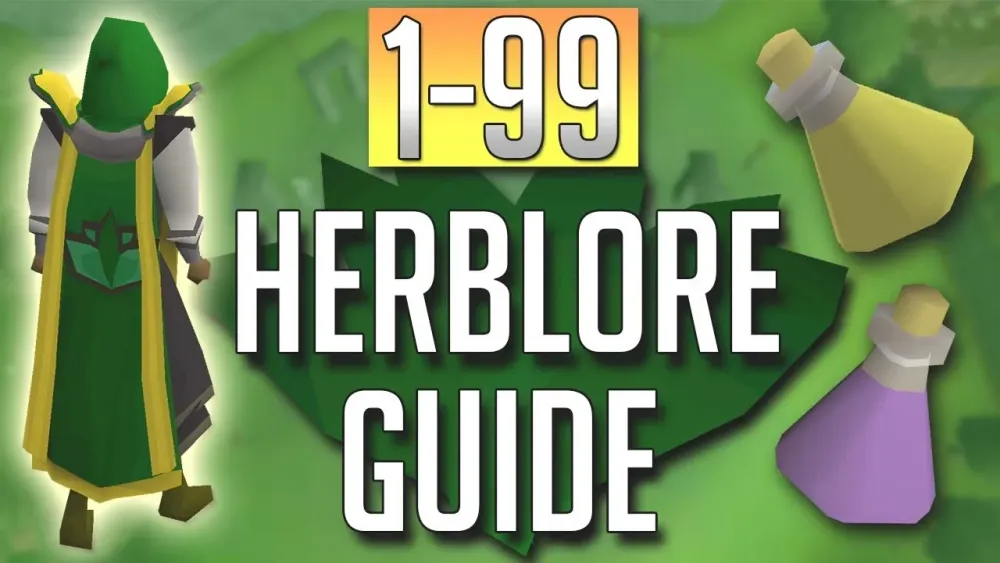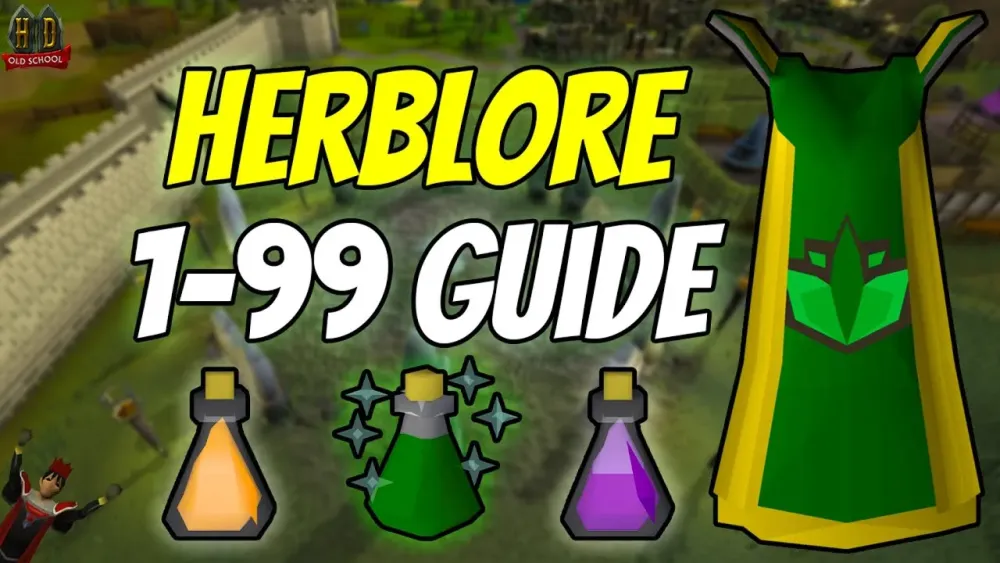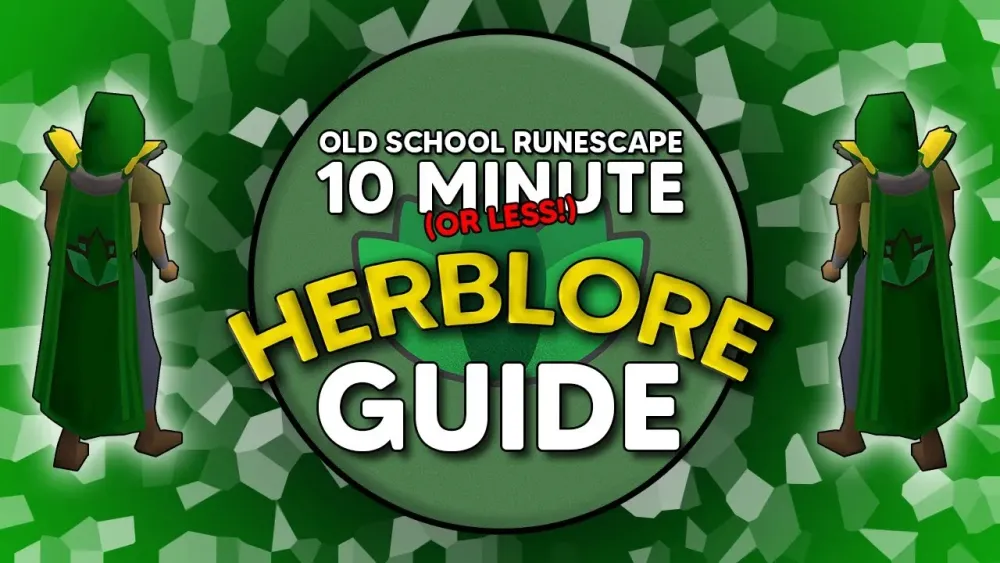Your cart is empty
Ultimate Guide to Herblore Training in OSRS

Herblore is a vital skill in Old School RuneScape (OSRS) that allows players to create potions, which can provide various benefits such as healing, stat boosts, and even special effects. Mastering this skill not only enhances gameplay but also contributes to completing quests and achieving overall success in the game. This guide aims to provide a comprehensive understanding of Herblore, including its mechanics and leveling strategies, to help players efficiently train this skill.
Herblore is leveled by mixing herbs and secondary ingredients to create potions. Each potion grants a specific amount of experience points (XP), which contributes to the overall Herblore level. Understanding the experience required for each level is crucial for effective training. The experience needed to reach level 99 is a staggering 13,034,431 XP, requiring strategic planning to maximize efficiency.
Levels range from 1 to 99, with each level unlocking new potions and abilities. At level 1, players can create a basic potion, while higher levels unlock more complex potions with greater benefits. For instance, making a Saradomin brew at level 81 provides significant healing and stat boosts, making it a popular choice among players.
Each potion requires specific herbs, which can be obtained through various methods such as farming, monster drops, or purchasing from players. The primary herbs used in Herblore training include Guam, Marrentill, and Tarromin, each corresponding to different potions. It is beneficial to familiarize oneself with the different herbs and their respective potions to optimize training.
Experience is gained from creating potions, and the amount varies based on the potion’s complexity. For example, creating a basic potion may yield 25 XP, while more advanced potions can yield over 200 XP per potion. To maximize experience gains, players should focus on potions that offer the highest XP per hour, keeping in mind the cost of ingredients and the time required to gather them.
Additionally, players can use experience-boosting items, such as the Herbalist’s outfit or the Well of Goodwill, to increase the amount of XP gained during training. Utilizing these items can significantly reduce the time required to reach higher Herblore levels, making the training process more efficient.
In summary, understanding Herblore levels and experience is essential for effective training. Players should focus on creating potions that yield the highest XP, familiarize themselves with the required ingredients, and consider using experience-boosting items to optimize their Herblore training journey.
Essential Items for Herblore Training

When it comes to leveling up your Herblore skill in Old School RuneScape (OSRS), having the right items on hand can make all the difference. Here’s a rundown of the essential items you should keep in your inventory:
- Herbs: These are your primary materials for training Herblore. Common herbs include Guam leaf, Harralander, and Ranarr weed. Each herb is used to create various potions.
- Vials: You’ll need empty vials to mix your potions. Make sure to stock up on these, as they are crucial for your potion-making process.
- Secondary Ingredients: Many potions require secondary ingredients. For example, to make a Attack potion, you need a Eye of newt. Be familiar with the recipes to gather these items beforehand.
- Herblore Potions: These potions are useful for boosting your Herblore level temporarily, allowing you to make higher-level potions.
- Experience-Boosting Items: Items like the Skillcape of Herblore or Amulet of the Forsaken can provide experience bonuses during training.
Having these items ready will ensure a smoother training experience. Always check the Grand Exchange for the best prices on herbs and other materials before you start your training session!
Best Methods for Training Herblore

Training Herblore efficiently can save you time and resources. Here’s a breakdown of some of the best methods to level up your Herblore skill:
| Method | Level Requirement | Experience per Action | Notes |
|---|---|---|---|
| Making Potions | 1+ | 25 (Guam potion) | Start with Guam potions and progress to higher-level potions as you level up. |
| Making Super Potions | 63+ | 100 (Super Attack potion) | Highly recommended for efficient experience gain. |
| Cleaning Herbs | 1+ | 1 per herb | Good for early levels and can be done while waiting for potions to brew. |
| Making Saradomin Brews | 81+ | 200 | High experience but costly. Great for profit if you have the ingredients. |
Each of these methods has its pros and cons, so consider your budget and goals when choosing how to train. Whether you prefer making potions or cleaning herbs, find a method that keeps you engaged and motivated!
5. Profitability of Herblore Training
When it comes to training Herblore in Old School RuneScape (OSRS), one of the primary concerns for players is profitability. You want to ensure that your training methods not only get you to your desired level but also make you some gold along the way. So, let’s break down the various aspects of Herblore training profitability.
1. Cost of Ingredients: Understanding the costs of the herbs and secondary ingredients you’ll need is crucial. Here’s a simple breakdown:
- Low-level potions (like Attack potions) require cheap herbs such as Guam.
- Mid-level potions (like Super Strength) require more expensive herbs, such as Kwuarm.
- High-level potions (like Saradomin Brews) can be quite costly but offer high returns.
2. Selling Potions: Once you’ve brewed your potions, selling them can be very profitable. Consider these points:
- High-demand potions typically include Super Restore and Saradomin Brew.
- Price fluctuations can occur due to market trends, so keep an eye on the Grand Exchange.
3. Profit Margins: The profit margins can vary significantly based on the level of Herblore you’re training:
| Herblore Level | Potion | Profit per Potion |
|---|---|---|
| 1-30 | Attack Potion | Low |
| 30-50 | Super Strength | Medium |
| 50+ | Saradomin Brew | High |
In conclusion, while training Herblore can be costly initially, focusing on high-demand potions can make your training profitable in the long run. Just remember to stay updated on market prices!
6. Herblore Quests to Boost Your Level
Quests are an excellent way to gain a significant boost in Herblore experience, often without the need to grind through the levels manually. Here’s a list of some of the most beneficial quests for Herblore training:
- The Dig Site: Completing this quest rewards you with 15,000 Herblore experience, which can be a game-changer for early levels.
- Grim Tales: This quest offers 10,000 experience, plus some interesting lore about the game.
- Herbalist’s Task: A recurring task that can provide up to 3,000 experience, allowing you to train while completing other objectives.
- Cold War: Completing this quest grants you 3,000 experience in Herblore, alongside some fun gameplay elements.
Each of these quests not only helps you level up quickly but also enriches your gameplay experience. Make sure you check the requirements before diving in!
In summary, quests are an effective way to supplement your Herblore training. They provide ample experience and can often lead to new opportunities and resources to further enhance your gameplay. Happy questing!
7. Tips and Tricks for Efficient Herblore Training
Training Herblore can be a rewarding experience in OSRS, but it can also be resource-intensive. Here are some tips and tricks to make your training more efficient:
- Plan Your Training: Before you start, have a clear plan. Decide whether you want to focus on making potions for combat, skilling, or profit.
- Use the Best Ingredients: Always use the highest quality herbs and secondary ingredients available to maximize your experience gain.
- Utilize Experience-Boosting Items: Items like the Herblore cape can give you experience boosts. Don’t forget to wear your Skillcape if you have one!
- Purchase Ingredients in Bulk: Buying herbs and secondary ingredients in bulk can save you time and money. Check the Grand Exchange for the best deals.
- Complete Quests: Many quests offer Herblore experience rewards. Completing these can give you a significant boost to your level.
- Join a Clan: Being part of an OSRS clan can provide you with support, tips, and even resources for your training.
- Use the Herblore Habitat: This area allows you to grow your own herbs, which can be a great way to gather materials for training.
With these tips, you can streamline your Herblore training and save valuable time while maximizing your experience gains!
8. Frequently Asked Questions about Herblore
Herblore can be a complex skill in OSRS, and it’s normal to have questions. Here are some frequently asked questions that can help clarify your understanding:
| Question | Answer |
|---|---|
| What is Herblore used for? | Herblore is primarily used for making potions that enhance combat, restore health, or provide other benefits. |
| What is the fastest way to train Herblore? | Using the highest-level potions available to you and completing quests for experience are the fastest methods. |
| Are there any profitable potions to make? | Yes, potions like Super restore potions and Serum 207 can be quite profitable when sold on the Grand Exchange. |
| How do I obtain herbs? | You can obtain herbs from monster drops, farming, and the Grand Exchange. |
| Do quests give Herblore experience? | Yes, many quests provide Herblore experience as a reward, which can significantly boost your level. |
If you have more questions about Herblore, feel free to ask! The community is here to help you on your journey!
Conclusion and Next Steps in OSRS
Herblore is a vital skill in Old School RuneScape (OSRS) that significantly enhances gameplay by allowing players to create potions, which can provide various combat and utility benefits. Mastering Herblore not only helps in quests and boss fights but also can be a lucrative money-making method.
To wrap up your Herblore training, consider the following steps:
- Gather Resources: Collect herbs and secondary ingredients needed for potion-making. Utilize farming, monster drops, or the Grand Exchange to stock up.
- Focus on Efficient Training: Prioritize potions that offer the best experience per hour. For example, consider making Super Strength Potions or Stamina Potions as they yield high experience.
- Utilize Experience Boosts: Take advantage of items like the Herblore Boosts (e.g., from the Wicked Hood) or events that grant temporary experience boosts.
- Join a Clan: Engage with other players in a clan to exchange tips, resources, and motivation for leveling up your Herblore skill.
- Complete Relevant Quests: Some quests offer significant Herblore experience rewards. Focus on completing quests like Dragon Slayer II or Making History.
As you progress in Herblore, consider diversifying your skills. Improving your Farming and Combat skills can enhance your overall efficiency in gathering materials and using your potions effectively. Embrace the journey, and enjoy the many benefits that Herblore brings to your OSRS experience!

